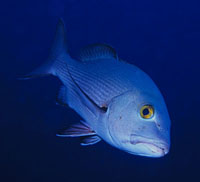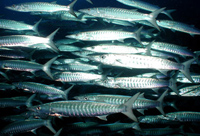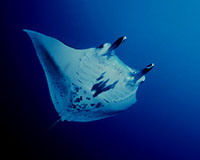|
|
 |
|
Predatory fishlife provided zest in Phoenix's rich cocktail
(c) Cat Holloway, NAI'A
|
All human endeavors are motivated by just a few primitive urges: eat, sleep, reproduce - and explore!
Five divers, five scientists, a doctor and a filmmaker tap into those gut feelings and set sail in search of the Primal Ocean.
"Oh no, what have I done?"
It was a sentiment I'd expressed privately more than once during those weeks - like an older brother tapping my shoulder and peering down his nose at my abundance of enthusiasm and deficit of good sense.
"Ugh, we should have sold this as a crash-diet cruise."
"Just take a pill and stop groaning," said Rob, he of the iron stomach.
Fine sailors among the seasick are as painful to endure as reformed smokers and as self-righteous as early-risers. As Rob bounded gleefully to the dawn-kissed deck for his rostered whale watch, I wondered about the other suffering fools on board NAI'A. Wedged into bed with extra pillows, curled against the glare of an unread copy of Moby Dick or The Perfect Storm, squinting through the port-holed sunbeams at their clocks - only 22 days of this misery to go. I know exactly what they were thinking because I was thinking the same thing: "It's all Cat's fault, she made me do this."
|
 |
|
Curious 'Snapass' abound in the Phoenix Islands
(c) Mary Jane Adams
|
|
|
It's true, I'm afraid. You see, my boyfriend - that's Rob - has this big sailing boat, sorry, ship - that's NAI'A. And while he and his family partners diligently attempt to pay relentless bills by hosting scuba diving expeditions in our delightful home country of Fiji, I feel compelled to lure them off-the business-course for cool new places. It's not like they are too hard to convince, though. It's that urge to explore. It rumbles and roars: "Let's do it. It sounds so wild!"
Well, it is wild. It's the same impulse that makes us strap a bomb to our back, breathe through a rubber hose and pretend that we (and our outrageously expensive cameras) are great mates with deadly sea snakes. It makes us reach out of a cage waving and smiling preposterously at a massive shark passing inches away en route to festering bovine bait. It makes us diver deeper than we planned. Stay longer than we ought. Go alone.
|
 |
|
Barracuda schools gathered at current-flushed peninsulas
(c) Cat Holloway, NAI'A
|
 |
|
Manta ray encounters were close and enduring
(c) Mary Jane Adams
|
|
Look, I'm not justifying it. I'm not saying it's right. But, c'mon, we've all done it. Risk. Possibility. It's intuitive, not intellectual. We take risks because of the remote possibility of synergy with the awesome, the beautiful and the mysterious: God.
Some risks are calculated - to the tune of many thousands of dollars, in fact. Which is what we'd asked these retching divers to pay for the privilege of joining this expedition and sponsoring a bunch of geeky Latin-speaking biologists. Our concept was humble:
- Team up eco-divers with adventurous scientists;
- Explore a place that no-one has ever been before;
- Gather fascinating facts and heady experiences to enlighten and inspire;
- Save the world.
|
|
I am no vacilando. (Incidentally, the only good thing about ocean passages is that you read, thereby developing superfluous vocabulary with which you look forward to impressing landlubbers upon return - assuming you have not coughed up your voice box in the process.) According to John Steinbeck in Travels with Charley, "If one is vacilando, he is going somewhere but doesn't greatly care whether or not he gets there." I admit to being a destination kind of girl. I may not have embraced the wisdom of ages that tutors us to love the journey of life, trust the process, go with the flow. But I do know this: Steinbeck was no high-paying tourist and the Dalai Lama has never been seasick. The sole desire linking everyone aboard NAI'A during that costly, stormy, five-day crossing was: just get us there. Phoenix Islands or bust. Seriously.
|
|
|
|
|
|
|
Dr Gregory Stone - Scientific Director
This is like stepping back into the land time forgot. For marine biologists, it's like going to the moon. The reefs show evidence of extreme isolation and, as a result, have interesting species assemblages and prolific growth. The reefs are in excellent health, free from the bleaching that has plagued other parts of the Pacific. Healthy coral reef fish populations are nearly impossible to find in areas inhabited by people. In Phoenix, free from human impact, the fish communities are diverse and abundant. We are seeing what pristine coral reef ecosystems can - and should - be!
We have discovered green turtle nesting sites on several islands and logged numerous pods of bottlenose dolphins as well as one beaked whale sighting. The surprising and disturbing news is the lack of sperm whales. This Phoenix Island group was one of the 19th century's richest sperm whaling grounds, attracting hunting ships from all over the world. However, we have found tens of thousands of nesting spectacled, sooty, little fairy and blue-gray terns; masked brown and red-footed boobies; red-tailed tropicbirds; brown noddies and greater and lesser frigate birds. The bird noise on some islands was so loud that researchers could barely hear each other during the surveys!
We deployed the National Geographic-sponsored deep-sea camera seven times, on each occasion to 3000 feet. During three deployments, the bait pole used to attract animals was violently torn off the rig by six-gill sharks! Six-gill sharks live only in deep water and this is the first confirmed record of these sharks in the region. We also filmed the massive deep sea Pacific sleeper shark.
|
|
|
|
|